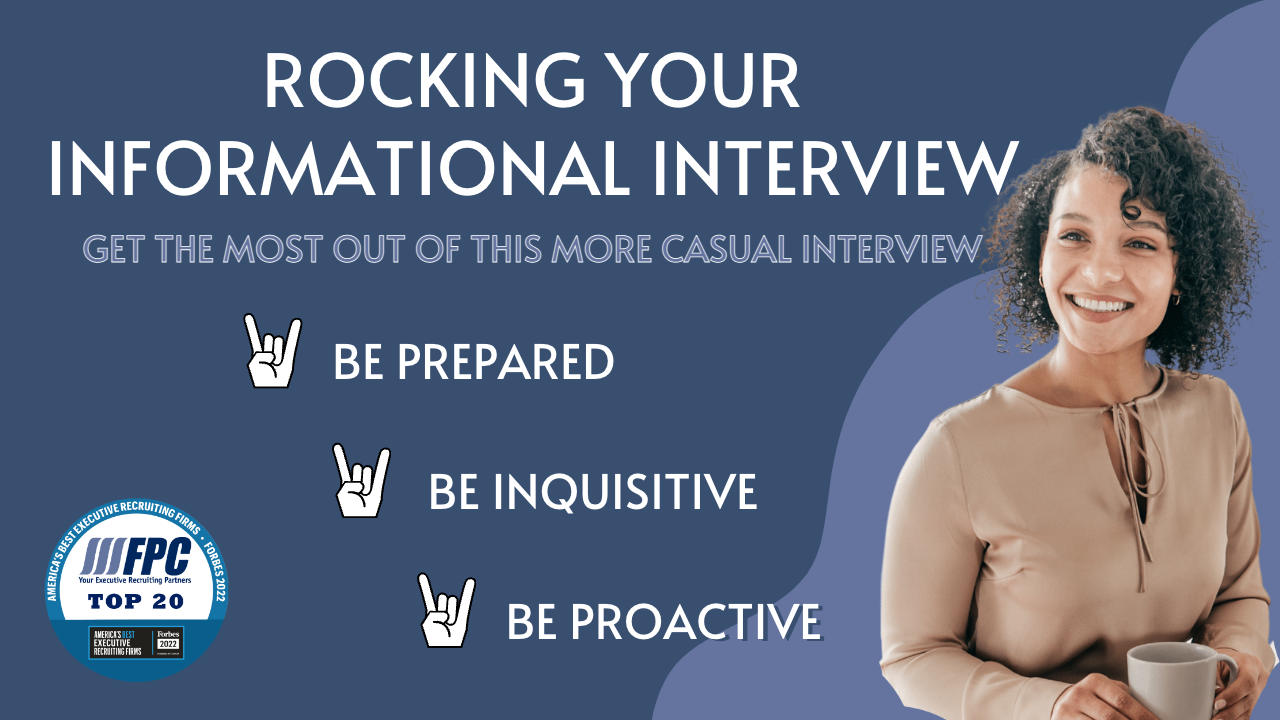Rocking Your Informational Interview
Job Seekers
So, you’ve landed an informational interview with an executive in a company where you would like to work. You now have the opportunity to engage with a decision-maker in an open-ended discussion about the company, the executive, and your background.
Informational interviews differ from formal interviews in that they often do not focus on a particular job, and they are more casual in nature. They give job seekers an opportunity to get a feel for the organization, cultivate relationships with potential colleagues or hiring managers, and put themselves on the radar for future job vacancies.
How can get the most out of your informational interview?
Be Prepared
Just because the interview is more casual than a formal interview, that’s no excuse to show up unprepared. Here is what you need to have ready:
- Company Research: Take the time to learn about the organization, including its history, products or services, mission statement, competitive position, and marketplace.
- Position Research: What roles may be relevant to you and your background? Identify the positions that you are targeting and develop an understanding of primary responsibilities and goals of these roles.
- Your Elevator Pitch: The implied intention of an informational interview is for data gathering, as opposed to a direct pitch for a job, so job seekers should tread lightly when it comes to self-promotion. But you should be prepared with a brief overview of your background, achievements, and value in case the conversation moves in this direction. You do not need to prepare with the same depth as you would with a formal interview, but you should have a clear and concise response for the “tell me about yourself” question in the event it is asked.
Be Inquisitive
One of the main purposes of an informational interview is data sharing. Your contact agreed to a discussion to provide information about their position, company, or industry. Come prepared with a list of questions that show your genuine interest. Here is a list of general questions you can customize for your informational interview:
- What was your career path at XYZ Company? This will give you an indication of growth opportunities at the organization. If your contact has the same title as when they started eight years ago, you can infer that mobility is slow or nonexistent at the company.
- How would you describe the culture at XYZ Company? You are looking for an honest answer about the positive AND negative aspects of working for the company. Learn if the environment is more nurturing and collaborative or more toxic and isolated. You may also be able to uncover if employees are supported, valued, overworked, or dissatisfied.
- What challenges do XYZ Company face in reaching their short-term and long-term objectives? The answer to this question will help you to craft your cover letter where you discuss how you can contribute to helping the company reach their goals.
- My background is in ______________ where I have a specialization in _____________. Do you think that this type of experience would be a good fit for XYZ company? Hopefully, you will uncover certain skillsets or experiences that the company is seeking for the position you are eyeing. Again, the answer to this question can be helpful when following up.
- What qualities does XYZ look for in a prospective employee in general? What about for the position of ______? Who is the best person to contact regarding employment for this role? Their answers will give you valuable insights you can use when you decide to pursue an opportunity with the company.
Be Proactive
You now have a wealth of insider knowledge that you can use to make a formal application for a position in the company. From your interview, you’ve uncovered some of the company’s goals, challenges, and priorities, as well as important information about what the company is seeking for the role you are interested in. You even know the person who you should be contacting regarding this position.
Write a note to thank your contact for the discussion. Share the insights you’ve uncovered and the value you received from the interview. Then state how your conversation made you want to be a part of the company and ask if it would be acceptable for you to use your contact’s name during the application process. If the answer is yes, then you are all set to send a personalized cover letter and resume to the hiring manager, mentioning that you had a prior discussion with your contact.
Informational interviews are a great way to get your foot in the door of a company you are targeting. Working with a recruiter will provide many of those same benefits, as they have much of the same information you would uncover during these discussions. With more than 60 offices throughout the country, FPC National has the network to help you make contact with decision-makers at thousands of companies in diverse industries. Reach out to your local office today to help land the job of your dreams.

